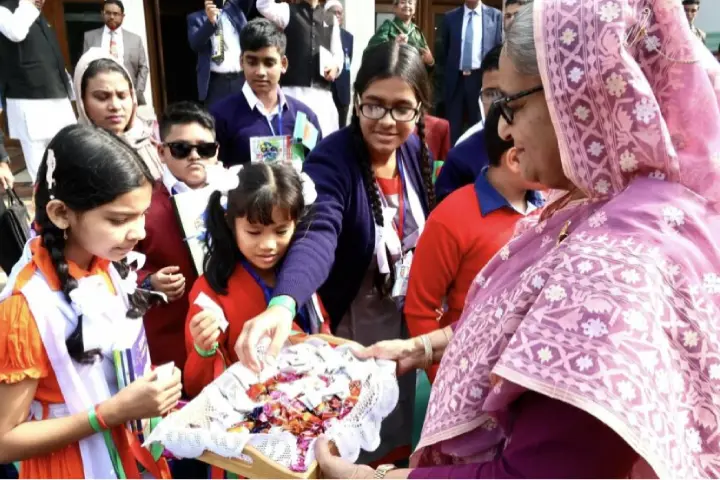It’s election year worldwide in 2024. Sixty four countries and 4.2 billion people, roughly half the world’s population of over eight billion, are going to the polls. While all eyes are on President Biden’s battle royal with former president Donald Trump in the US later this year, more immediately from India’s point of view are elections in Bangladesh this weekend followed by elections to Bhutan’s National Assembly. Pakistan votes in February.
Bangladesh
Prime Minister Sheikh Hasina is widely expected to sail through to victory and here she is being helped by an opposition boycott: the BNP is refusing to take part since Hasina has rejected calls for a caretaker government to oversee the election process. Despite that, reports say a crackdown on the BNP is underway with as many as 10,000 of its partymen in jail and its leader, the ailing Khaleda Zia under house arrest. The Islamic parties appear to have been more leniently dealt with, adding to the growing volume of reports that Hasina is in fact wooing the Islamists while professing secularism otherwise. The US has placed visa restrictions on government leaders ostensibly over the twisted election process but as always, it is about something else. India is backing Hasina (it has no other candidate) and sees in her re-election a continuance of India-friendly policies. What happens after her is anybody’s guess.
Bhutan
The region’s youngest democracy holds elections to the 47-member National Assembly on Jan 9 with an unprecedented five parties in the fray. There are no great ideological differences among the parties, all of which bow to the monarchy. Current Prime Minister Lotay Tshering is pushing hard for a comeback despite widespread unhappiness over the handling of the economy, which has seen an exodus of young people to places like Australia. The economic situation has delivered a hard knock to Bhutan’s Gross National Happiness (GNP) index where GDP apparently, matters less than the “well-being and contentment” of the people. India is not an issue in the election although it is closely watching Thimphu’s negotiations with China over the border.
Pakistan
Million-dollar question: does it matter given that ousted prime minister Imran Khan’s PTI has been kicked out of the fray and he remains in jail. While three-times former prime minister Nawaz Sharif is widely expected to win, the military-dominated establishment’s decision to allow the terrorist Lashkar-e-Toiba to run in the polls suggests old habits die hard. There is little to indicate any serious effort to come to grips with the country’s bankrupt economy and the underlying and long-standing political disfunction which drives it. Unlike its fulminations over the ‘death of democracy’ in Bangladesh, the US has shown no interest in what’s going in in Pakistan nor commented on it.
Taiwan
From a geopolitical standpoint, the Taiwan election on Jan 13 could be seminal. The last opinion poll in the 10-days before voting put the ruling DPP candidate and Vice-President Lai Ching-Te ahead of his nearest Kuomintang Party rival by three to 11 percentage points. If this translates into votes on election day, it puts the DPP back into power for an unprecedented third term and more tensions with China.
Russia
The buzz as Russia heads for elections on March 15 is not whether President Putin will win a fifth term; the question is by how much. The ruling establishment is seeking nothing less than an 80% margin of victory with a 70% turnout. Count on local officials to oblige and for Putin to strike off another record, that of being the longest-serving leader since Czarist times. The opposition has been crushed, key leaders like Andrei Navalny are in prison and any criticism of the war in Ukraine is not acceptable. The people at large are more concerned about wages, pensions, and the housing crisis but these are not for public debate. Russians are stuck with Putin, for better or worse.
Britain and Europe
Elections are due only in December, but UK Prime Minister Rishi Sunak is under pressure from poor ratings (he is the first choice in just four seats nationwide), a faltering economy and the right wing of his own Conservative Party led by Boris Johnson. The latter has never forgiven him for walking out of his government in July 2022, which is seen as the final nail in his coffin. Of course, Johnson hopes to come back and the majority of the right wing is backing him, with the result Sunak seems to be more pre-occupied with dealing with his own party than addressing issues of public concern. The opposition Labour is rising although doubts remain about its leader Keir Starmer’s ability to unite the party behind him. Starmer will also have to contend with the extreme left-wing, which, led by former prime minister Jeremy Corbyn, remains a formidable force.
(The story is being republished courtesy StratNews Global)




















